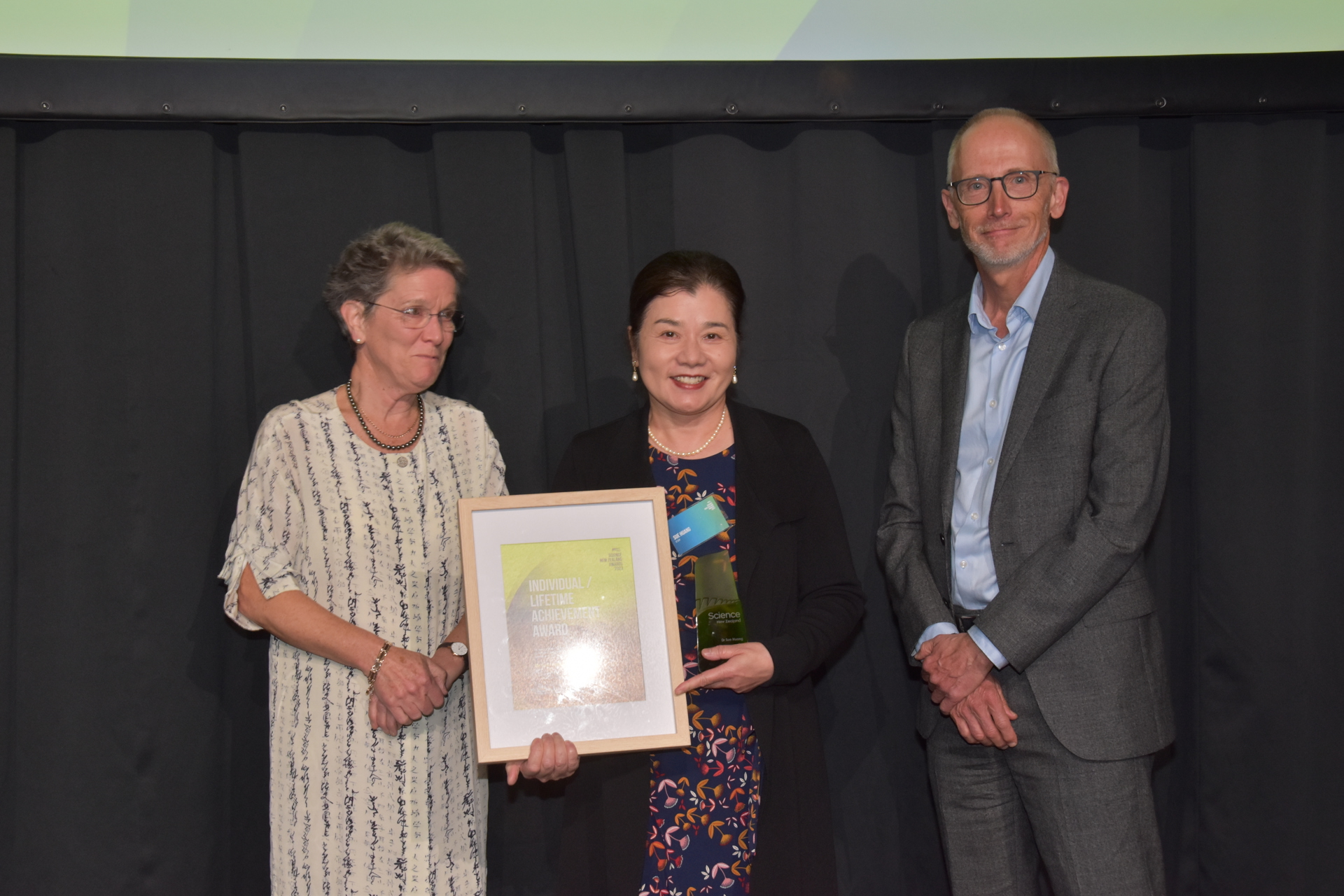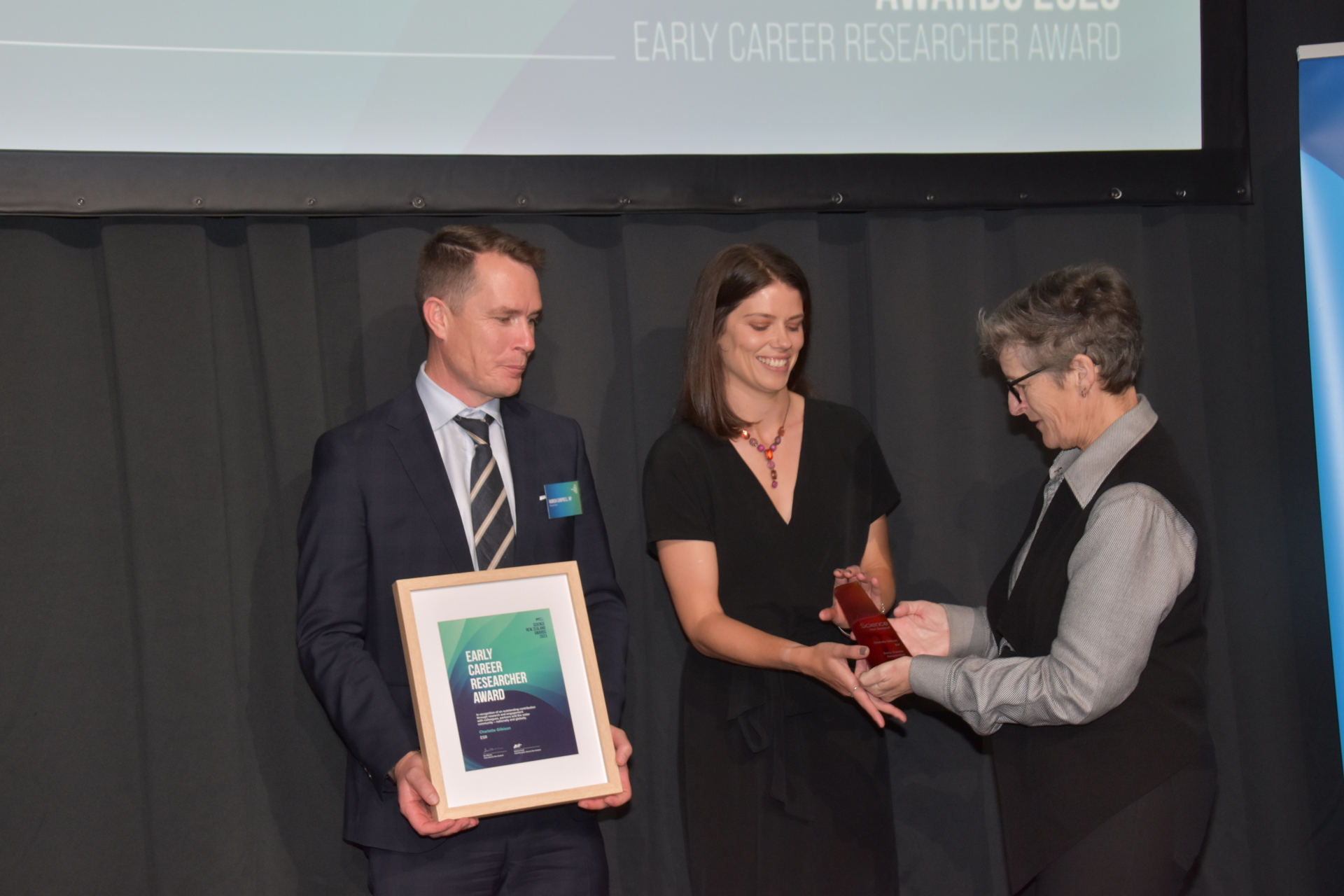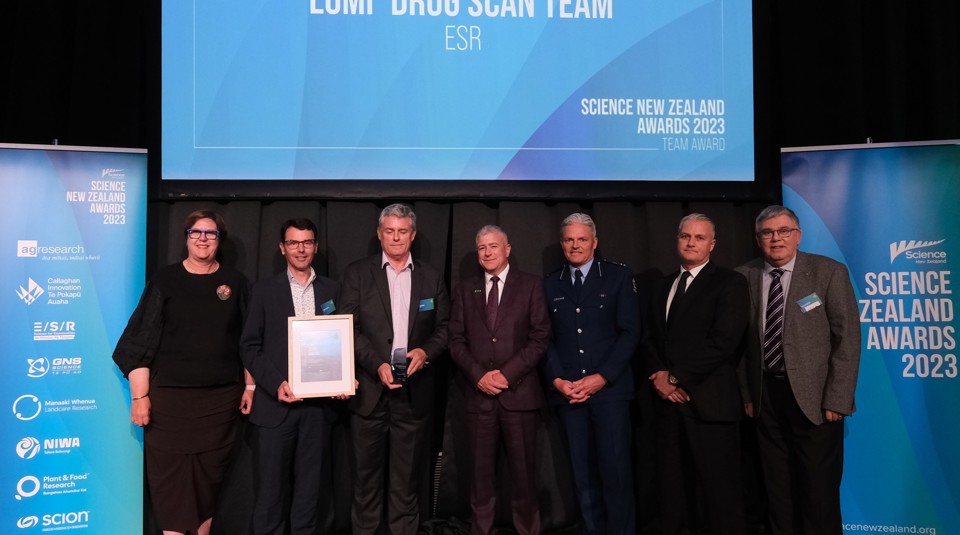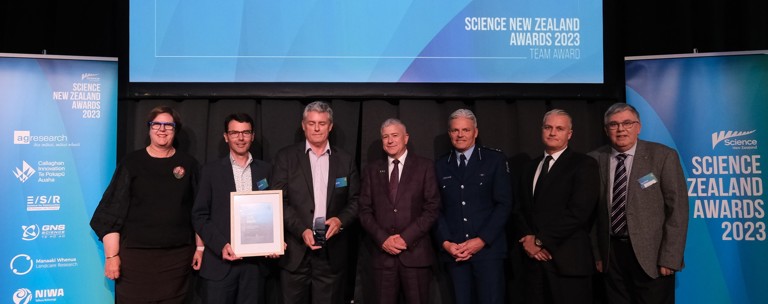The atmosphere was electric at Parliament as the 2023 Science New Zealand Awards got under way on Wednesday, with members of the ESR whānau joining dignitaries, stakeholders, and colleagues to celebrate the incredible achievements of Kiwi scientists.
We were delighted to see our own Honorary Professor Sue Huang, Charlotte Gilkison and the team members behind Lumi™ Drug Scan being recognised too, respectively receiving the Lifetime Achievement Award, Early Career Researcher Award, and Team Award.
Receiving these awards underscores the massive contribution this group is making to the health and security of New Zealand.ESR's awardees joined scientists and researchers from our six fellow Crown Research Institutes plus Callaghan Innovation.
The COVID-19 Team won the Supreme Award back in 2020, and while ESR’s awardees didn’t take home Supreme this time round, the Awards were still an important opportunity to reflect on their remarkable work.

‘I feel really humbled to receive this because it’s a great team effort’ – Honorary Professor Sue Huang, Lifetime Achievement Awardee
Honorary Professor Sue Huang is a virology expert whose career has seen her recognised as an international leader in the fight against the world’s most prevalent infectious diseases, and whose insights protect us all. Sue is Principal Investigator of the groundbreaking, internationally-backed Southern Hemisphere Influenza and Vaccine Effectiveness Research and Surveillance (SHIVERS) studies which investigate how viruses are transmitted and if early exposure can produce stronger immunity. Insights from SHIVERS are leading to more effective vaccines, benefitting all humanity.
“SHIVERS is a long series of studies on flu virus and flu vaccine. The final aim is trying to inform universal influenza vaccine development,” Sue says.
Professor Nikki Turner, Medical Director Immunisation, Advisory Centre and Professor General Practice and Primary Healthcare, University of Auckland, has collaborated with Sue for over 15 years. Professor Turner reflects on the significance of Sue’s career and contributions: “I think before COVID people didn’t realise how important respiratory viruses were, and how important influenza is. And Sue has been working away with outstanding international and local researchers over those years on a topic that kills hundreds of people a year.”
With an outstanding h-index of 40, Sue’s research is informing critical global research and policy. Sue is Director of the World Health Organization National Influenza Centre, and from her research, she helps ensure yearly influenza vaccinations provide the best protection possible for New Zealanders. Sue is highly regarded for her kindness and enthusiasm about science – whether she’s working with colleagues, media, or the community of volunteers proud to participate in her research.

‘The COVID pandemic has highlighted the role that we have in keeping New Zealanders safe’ – Charlotte Gilkison, Early Career Researcher Awardee
When Charlotte Gilkison completed her Master of Public Health degree in 2018, she wasn’t expecting to soon be part of back-to-back public health responses. Within just a few years Charlotte has made a remarkable contribution to epidemiology and has been at the forefront of Aotearoa’s response to the ‘once in a generation’ pandemic. Her master’s thesis shone a light on leprosy in the Pacific; her unyielding passion and expertise made Charlotte invaluable when highly infectious measles emerged in Aotearoa in 2019. And when the then-exotic pathogen SARS-CoV-2, AKA COVID-19 was identified in early-2020, Charlotte helped set up the system that would become Aotearoa’s COVID-19 Surveillance Programme.
“I work in infectious disease surveillance so I monitor the epidemiology of infectious diseases, respond to outbreaks, and assess the risks of overseas emerging threats,” says Charlotte.

Charlotte continues to play an integral role in ESR’s infectious disease surveillance work while contributing to a growing body of research, and is currently seconded to Te Whatu Ora’s National Public Health Service (NPHS), co-creating an ESR and NPHS work programme for improving public health outbreak information systems. Whenever an infectious disease poses risk to our communities, Charlotte and her colleagues will be ready to respond through timely, robust science.
On the significance of Charlotte’s contribution to public health science, Dr Andrea McNeill, ESR Technical Lead Epidemiology notes: “Charlotte receiving this award is wonderful recognition of the last five years that she’s worked at ESR since she gained her Master’s in Public Health and the work that she’s done to contribute to bettering public health for New Zealand.”
“There is still a lot of ‘under the radar’ work that we do. I see this as a win not just for me but as a win for my colleagues in health surveillance and intelligence,” says Charlotte.

‘The team was the key ingredient that made Lumi™ happen’ – Dion Sheppard, Lumi™ Drug Scan Team Awardee
Trust and confidence at the frontline stems from reliable and consistent decision making. Lumi™ Drug Scan, developed by a team of ESR forensic experts working with police, is a revolutionary approach to drug investigations, making forensic science accessible to frontline responders. Lumi™ enables police to safely detect illicit drugs within seconds, while providing rich data and insights about drug use in Aotearoa.
“Lumi™ can currently detect methamphetamine, cocaine, and MDMA, which are the three highest priority targets for New Zealand Police. They’re the drugs that represent the highest harm. It started in conversations with Police about what they were wanting to do.
“The team was really the key ingredient that made Lumi™ happen – we were lucky enough to have a really good diversity of expertise to draw on,” says Dion Sheppard, Lumi™ Drug Scan Manager.
This Kiwi technology delivers science at the point of need, empowering rapid detection of illicit substances by analysing packaged samples on a palm-sized scanning device that harnesses infrared to determine if cocaine, ecstasy, or methamphetamine are present. The device is paired via Bluetooth with the Lumi™ App on the officer’s smartphone, powered by sophisticated machine learning algorithms in the cloud developed from over 600,000 scans from drug samples curated by ESR scientists. Lumi™ is a game-changing innovation supporting better policing and drug harm reduction in communities.
“A key enabler of the Lumi™ project was that relationship with New Zealand Police,” Dion says.
"Congratulations for winning the Team Award. It's a fantastic recognition of all the hard work and collaboration between New Zealand Police and ESR," says Inspector Simon Welsh, Manager Implementation & Evaluation, Evidence Based Policing Centre.
“Lumi has certainly got an amazing response from our frontline staff. It makes it easier to identify drugs on the side of the road, and it's more efficient.”


